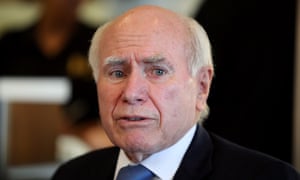Extract from The Guardian
Former PM plays down federal implications of Victorian drubbing and says Coalition can still win in 2019
John Howard
has urged federal Liberals not to panic over the drubbing in the
Victorian state election, and has declared there is no prospect of a
split.
The former prime minister used an interview on the ABC on Tuesday evening to play down the significance of recent electoral setbacks, and warn his former colleagues not to allow political opponents and “people who are not friendly to us as a Liberal collective” to define the Liberal party ideologically.
Howard’s intervention follows a decision by the Victorian Liberal Julia Banks on Tuesday to quit the Morrison government and sit on the crossbench, undercutting Scott Morrison’s efforts to stabilise the government and project an orderly pathway to the next election.
With the government’s political difficulties intensifying, Labor is also circling in an effort to refer the home affairs minister, Peter Dutton, to the high court with the backing of the expanded and emboldened crossbench.
The government has underscored its own difficulties in managing the
chamber in minority by releasing a new parliamentary calendar for 2019
that confirms only two sitting weeks are planned before the government
hands down a budget on 2 April, and goes to the polls for an election in
May.The former prime minister used an interview on the ABC on Tuesday evening to play down the significance of recent electoral setbacks, and warn his former colleagues not to allow political opponents and “people who are not friendly to us as a Liberal collective” to define the Liberal party ideologically.
Howard’s intervention follows a decision by the Victorian Liberal Julia Banks on Tuesday to quit the Morrison government and sit on the crossbench, undercutting Scott Morrison’s efforts to stabilise the government and project an orderly pathway to the next election.
With the government’s political difficulties intensifying, Labor is also circling in an effort to refer the home affairs minister, Peter Dutton, to the high court with the backing of the expanded and emboldened crossbench.
“When you look at the fundamentals, nationally, we have got a very good story to tell,” the former prime minister said. “Sure, we are disappointed about what happened in Victoria, but one of the things that we have to do is not automatically extrapolate that into the federal scene.”
Howard said the weekend result in Victoria, where voters in heartland Liberal electorates lodged massive protest votes, was “overwhelmingly for state reasons and, can I give credit where it is due? I think Daniel Andrews was a very good campaigner. He explains things clearly, simply and well and Victoria has had a history for quite some years now, some decades, in fact, of being slightly more to the centre-left – the Massachusetts of Australia, some people call it.”
He said the moderate and conservative wings of the Liberal party needed to be accommodated, and the government needed to define itself rather than let opponents define its character.
“I hear expressions like hard right. What is meant by hard right? Someone who has got a conservative social position? That is not hard right. That is just being an ordinary conservative who sees value in preserving things from the past that are working well. There is nothing hard right about that. That is just common sense.”
Morrison attempted on Tuesday to issue his own message of reassurance, saying the government would be in a position to deliver a surplus budget before going to the polls next year.
The poor performance in Victoria has emboldened party moderates to warn their colleagues the government will be wiped out at the next federal election without a reset on issues like climate change.
Banks told the chamber on Tuesday her “sensible centrist values, belief in economic responsibility and focus on always putting the people first and acting in the nation’s interest” had remained constant but those values were now incompatible with the Liberal party.
“The Liberal party has changed, largely due to the actions of the reactionary and regressive right wing who talk about and to themselves rather than listening to the people,” she told the chamber.
She said moving to the crossbench to become an independent would allow her to continue to put the people before the party and “act in the nation’s interest constructively”.
Banks said she would guarantee supply and confidence, and would make a decision in the new year “about my career path”.
She was backed by her friend and the party’s former deputy leader Julie Bishop. Bishop said she was “saddened that Julia Banks had reached a point that she felt that she could no longer continue in the Liberal party”.
She said Banks’ departure highlighted “the fact the Liberal party needs and should have more female representatives”.

No comments:
Post a Comment